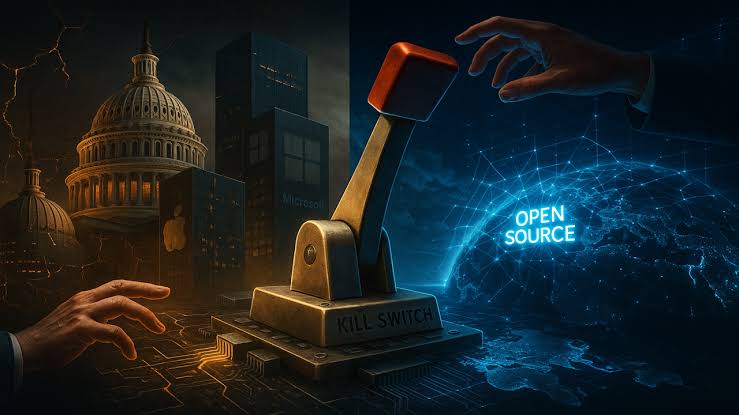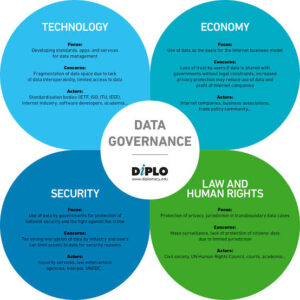Digital Governance Fears Rise: Who Controls America’s Data

In the US, control over data is a shared and controversial area involving Big Tech companies. Today we will discuss about Digital Governance Fears Rise: Who Controls America’s Data
Digital Governance Fears Rise: Who Controls America’s Data
In today’s digital world, data has become one of the most powerful assets on Earth. Governments, corporations, and private entities rely on it to make decisions, build systems, and shape the future. Yet as more of America’s sensitive information becomes digitized, a pressing concern has emerged: Who truly controls Americans’ data, and how securely is it being handled?
The recent rise of the Department of Government Efficiency, commonly known as DOGE, has intensified this debate. Introduced as a modernization effort to streamline federal systems, DOGE has been given access to various sensitive databases across major federal agencies. But the breadth of its authority, lack of transparency, and growing influence have raised fears about privacy, cybersecurity, and democratic accountability.
This article explores the rising concerns surrounding digital governance, the potential risks of centralized data control, and the broader implications for American society.
Centralized Digital Power and the Emergence of DOGE

What Is DOGE?
The Department of Government Efficiency (DOGE) was introduced with the goal of cutting bureaucracy and improving the efficiency of federal operations. It gained nationwide attention due to both its mission and its unique leadership associated with major figures in the tech world.
While its stated objective is to fix inefficiencies in government systems, concerns quickly emerged over its extremely broad authority — particularly its rapid and far-reaching access to critical federal data.
Unprecedented Access to Federal Data
Reports indicate that DOGE has accessed sensitive databases housed in multiple federal agencies. These include:
Treasury Department systems, which process Social Security, Medicare, federal payroll, and veterans’ benefits.
Social Security Administration records, containing names, birth data, Social Security numbers, and beneficiary information.
Office of Personnel Management files, detailing personal information on millions of federal employees and contractors.
The scale of this access is unprecedented. Experts warn that such broad control over essential systems creates a single point of vulnerability — an irresistible target for both internal abuse and external cyberattacks.
Oversight Concerns
A number of alarming patterns have emerged:
Cybersecurity Roles Removed
Key cybersecurity staff and audit controls within certain agencies were reportedly dismissed or sidelined. This weakens the natural defenses protecting sensitive data from breaches.Unvetted Personnel with Access
Several DOGE staff members reportedly lacked traditional government vetting. Claims include the use of personal emails for official access and bringing personal devices into restricted systems.Cloud Storage of Sensitive Data
Some whistleblowers allege that sensitive Social Security and Treasury data were copied into external cloud environments with insufficient monitoring.Use of Private AI Systems
DOGE has been reported to use a specialized version of a privately owned AI system to analyze government data, raising serious conflict-of-interest concerns and fears about data leakage.
These issues form the foundation for what many experts call a “digital governance crisis.”
Legal and Ethical Implications
Does DOGE Violate Existing Privacy Laws?
The United States has longstanding laws governing how federal agencies can handle personal data, especially the Privacy Act of 1974. This legislation restricts the sharing, handling, and processing of data without a clear and justified need.
Legal scholars argue that DOGE’s sweeping access to federal databases may conflict with the Privacy Act because:
Access was not clearly justified under “need-to-know” rules.
Oversight mechanisms were bypassed.
Sensitive data was handled without standard auditing.
Multiple states have launched legal challenges to halt DOGE’s access, with some courts blocking data sharing and others allowing temporary or partial access while legal battles continue.
Democratic Accountability Risks
America’s democracy relies on checks and balances. Centralizing vast amounts of personal data in the hands of a single department — especially one tied to powerful private interests — risks undermining that structure.
Major concerns include:
Potential political misuse of data to target opponents or influence the electorate.
Conflicts of interest, if private companies involved in DOGE benefit financially or strategically from access to federal data.
Lack of transparency, leaving the public uninformed about how their data is being used.
Experts warn that ignoring these issues could fundamentally shift the balance of power within the U.S. government.
Broader Digital Governance Risks
The Threat of Techno-Authoritarianism
Traditionally associated with authoritarian governments, techno-authoritarianism refers to the use of advanced digital tools to monitor, control, or manipulate populations. Critics warn that the U.S. may be unintentionally drifting toward a similar model if centralized digital power continues to grow without oversight.
Monitoring systems, biometric data, welfare information, employment records, and even behavioral analytics could be consolidated into unified federal profiles if current trends continue — presenting a serious threat to civil liberties.
The Mosaic Effect
Another major concern is the mosaic effect, where seemingly harmless datasets, when combined, reveal sensitive information. For example:
Employment data + Medicare records
Tax filings + Social Security info
Travel logs + benefit claims
Together, these can form highly detailed personal profiles — even if each dataset individually appears non-sensitive.
Centralizing data under DOGE increases the risk of such unintended privacy violations.
Governance Failures Are Common
Digital governance is notoriously difficult to implement. Even large corporations frequently fail to enforce effective frameworks due to:
Misalignment between leadership and operations
Lack of staff cooperation
Resistance to data transparency
Fragmented or outdated technological infrastructure
If private companies struggle, critics question why a new, rapidly constructed department like DOGE would fare better — especially when tasked with managing national-level systems.
Growing Concerns Across the Country
Civil Liberties Organizations
Privacy advocacy groups have warned that centralizing sensitive data under a department with limited oversight poses a direct challenge to American civil liberties. They emphasize:
The risk of mass surveillance
The possibility of data being used for political manipulation
The danger of partnering with private companies tied to powerful individuals
Legal Experts and Scholars
Legal analysts argue that the current digital governance structure is outdated and inadequate. Many believe the Privacy Act needs a major overhaul to address new challenges such as:
AI-driven data analysis
Cloud-based systems
Cross-agency data aggregation
Outsourcing of government technology to private firms
Cybersecurity Professionals
Cybersecurity experts express deep concern about weakened defenses across federal agencies. Removing or bypassing security staff, disabling audit logs, and allowing unvetted personnel into sensitive environments all pose catastrophic risks.
Some warn that America may be facing the largest national digital vulnerability in modern history.
Solutions and Pathways Forward
To protect American citizens and preserve democratic integrity, the U.S. must take significant steps to modernize and secure data governance.
1. Strengthening Federal Privacy Laws
Modernize the Privacy Act to reflect today’s digital infrastructure.
Create strict access controls for all federal databases.
Require clear justification and documentation for any cross-agency data sharing.
Enforce real penalties for misuse or unauthorized access.
2. Improving Cybersecurity Practices
Restore and expand cybersecurity roles across federal agencies.
Adopt a zero-trust architecture to verify every access request.
Require independent, third-party audits for any private technology used in government systems.
3. Increasing Transparency
Publish regular transparency reports on which agencies or departments access sensitive data.
Require public disclosure of all contracts with private companies handling federal information.
Enforce robust whistleblower protections to encourage reporting of misuse.
4. Decentralizing Sensitive Data
Instead of consolidating everything into a single system, the government should consider:
Federated data models
Decentralized databases
Privacy-preserving tools that minimize unnecessary data collection
These reduce the risk of total breaches and prevent any single entity from gaining too much control.
5. Raising Public Awareness
Citizens need to be informed about how their data is collected, stored, and used. Encouraging public participation in debates on data governance is essential to ensuring policies reflect the public’s interests — not just institutional convenience.
Conclusion
The rise of digital governance has unlocked powerful tools for efficiency, automation, and modernization. Yet the dramatic expansion of departments like DOGE has revealed deep vulnerabilities in how the U.S. manages, secures, and oversees its massive reservoirs of sensitive data.
The core question remains:
Who controls America’s data, and who should control it?
Without transparent oversight, modern legal frameworks, strong cybersecurity, and democratic accountability, the risks posed by centralized digital power could outweigh the benefits. As the U.S. faces a historic turning point in its digital evolution, the choices made now will determine whether the nation embraces a model of digital freedom — or drifts toward unchecked data control.
The future of American digital governance depends on ensuring that power over personal data resides not with an unregulated department or private entities, but with accountable institutions that safeguard the rights and privacy of every citizen.
How useful was this post?
Click on a star to rate it!
Average rating 0 / 5. Vote count: 0
No votes so far! Be the first to rate this post.
About the Author
usa5911.com
Administrator
Hi, I’m Gurdeep Singh, a professional content writer from India with over 3 years of experience in the field. I specialize in covering U.S. politics, delivering timely and engaging content tailored specifically for an American audience. Along with my dedicated team, we track and report on all the latest political trends, news, and in-depth analysis shaping the United States today. Our goal is to provide clear, factual, and compelling content that keeps readers informed and engaged with the ever-changing political landscape.




